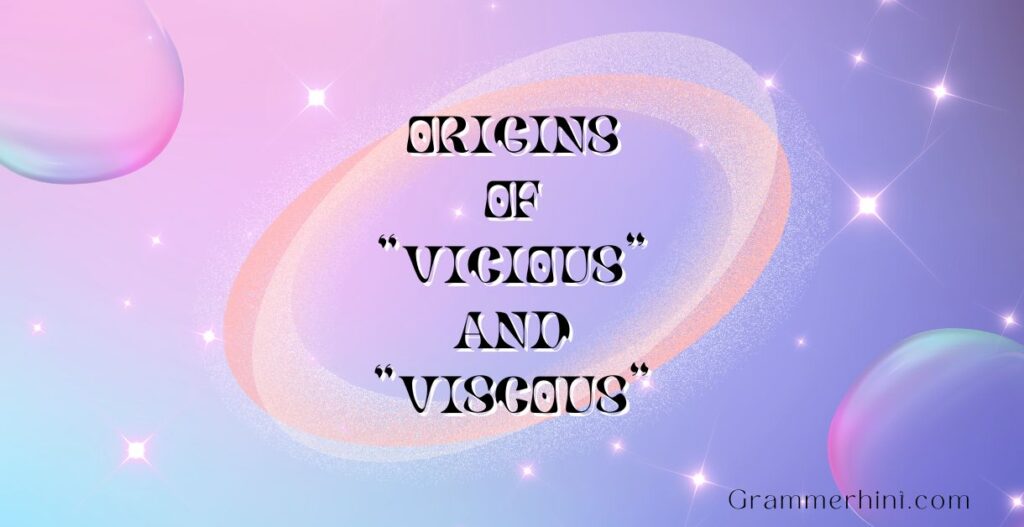Why is There Confusion?
English is full of similar sounding words that look alike, sound alike, but mean wildly different things. Among the most commonly misused adjectives are vicious and viscous.
Both are adjectives, both start with “vi-“, and both end in “-ous.” But their meanings couldn’t be more different.
These are easily confused words, often misused in writing, speech, and even by native speakers. The confusion stems from:
- Spelling similarities
- Pronunciation confusion
- Both being adjectives
- Lack of clarity in word meaning differences
To use them correctly, you need to understand their definitions, uses in real-life contexts, and etymological backgrounds. Let’s break it all down.
What Does the Word “Vicious” Mean?
The adjective vicious is tied to cruel, aggressive, or dangerous behavior. It’s used to describe harmful, hostile, or malicious actions or people. A vicious dog, a vicious attack, or a vicious rumor all indicate ruthless actions with negative connotation.
Vicious – Semantic Concept of Cruelty/Aggression
It’s a word drenched in malice, spite, and often violent intent. In language, it paints a harsh and emotional picture, often pointing to psychological abuse, criminal behavior, or social conflict.
- Vicious cycle: A repeating situation that only gets worse.
- Vicious rumor: A deliberately harmful or hostile rumor.
- Vicious predator: An animal or person with aggressive intent.
How Do You Spell Vicious?
Many people ask, “how do you spell vicious?” The correct spelling is v-i-c-i-o-u-s. Don’t confuse it with viscous or viscus.
- Pronunciation: /ˈvɪʃ.əs/ (VISH-uhs)
Common Contexts for “Vicious”
- Criminal behavior: “The suspect was known for his vicious assaults.”
- Social issues: “The politician launched a vicious attack on his opponent.”
- Psychological abuse: “It was a vicious cycle of manipulation and guilt.”
What Does the Word “Viscous” Mean?

The word viscous describes something thick, sticky, or resistant to flow. Think of syrup, molasses, honey, or oil.
Viscous – Semantic Concept of Thickness/Physical Property
It’s often used in science, cooking, manufacturing, and chemistry. Viscosity refers to a fluid’s resistance to flow, which is what makes a substance gooey, sticky, or syrupy.
- Viscous liquid: A thick liquid like molasses
- Viscous syrup: Maple syrup or honey
- Viscous batter: Thick pancake or cake batter
- Pronunciation: /ˈvɪs.kəs/ (VISS-kuhs)
Contexts Where “Viscous” Is Common
- Cooking: “The stew thickened into a viscous broth.”
- Chemistry: “Non-Newtonian fluids exhibit viscous behavior under pressure.”
- Manufacturing: “The material’s viscous texture made it ideal for adhesives.”
“Vicious” vs “Viscous”: The Differences
| Aspect | Vicious | Viscous |
|---|---|---|
| Part of Speech | Adjective | Adjective |
| Pronunciation | VISH-uhs (/ˈvɪʃ.əs/) | VISS-kuhs (/ˈvɪs.kəs/) |
| Meaning | Cruel, harmful, violent | Thick, sticky, slow-flowing |
| Used In | Criminal behavior, rumors, conflict | Cooking, science, industrial use |
| Common Synonyms | Cruel, brutal, hostile, aggressive | Gooey, syrupy, adhesive, thick |
| Opposites | Kind, gentle, friendly | Thin, runny, liquid |
| Semantic Concept | Cruelty, aggression | Physical thickness or resistance |
Understanding viscous vs vicious is crucial to improve writing clarity. They belong to different realms entirely—psychological vs physical, aggression vs texture, social vs scientific.
Examples in Context
Let’s dive into real-life scenarios that highlight the vicious vs viscous distinction.
Vicious:
Email example – Workplace conflict
Subject: Regarding Today’s Incident
Hi Alex,I wanted to address the vicious rumor circulating about the management changes. Such hostile behavior not only disrupts team morale but also fosters a vicious cycle of mistrust and retaliation. Let’s talk tomorrow to clarify things.
Best,
Monica
Narrative example – News story
The crowd fled the scene after a vicious dog broke loose, launching a violent attack on pedestrians. The animal was known for its aggressive intent and dangerous behavior.
Legal example – Criminal context
The judge referred to the defendant’s actions as brutal and vicious, citing ruthless actions fueled by malice and spite.
Viscous:
Email example – Culinary business
Subject: Sauce Consistency for New Dish
Hey Jordan,The tomato glaze for the meatloaf turned out too viscous—almost like glue. We’ll need to thin it down with some broth or wine to improve the pourable texture. Let’s meet tomorrow before prep to test it again.
Thanks,
Chef Laura
Lab report – Chemistry context
The substance demonstrated high viscosity, making it hard to mix. The viscous liquid clung to the beaker walls, indicating properties similar to molasses or syrup.
Industrial example – Manufacturing context
Due to its viscous consistency, the adhesive polymer offered strong flow resistance, suitable for high-friction applications.
of “Vicious” and “Viscous”Synonyms
Synonyms of “Vicious”:
- Cruel
- Harmful
- Aggressive
- Violent
- Malicious
- Dangerous
- Brutal
- Hostile
Synonyms of Viscous:
- Sticky
- Thick
- Syrupy
- Adhesive
- Gooey
- Slow-flowing
- Gluelike
- Molasses-like
Origins of “Vicious” and “Viscous”

Understanding the etymological roots deepens appreciation for these words and their distinctions.
Origins of “Vicious”
- Comes from Anglo-French and Old French vicios
- Rooted in Latin: vitiosus (full of faults) and vitium (fault or vice)
- Related to negative moral character
- Reflects the semantic concept of aggression, cruelty, and fault
Key takeaway: Vicious is morally or emotionally loaded. It’s about people, actions, or systems gone wrong.
Origins of “Viscous”
- From Latin: viscosus meaning “sticky” and viscum meaning mistletoe or birdlime (a sticky substance)
- Related to PIE root “weis-” meaning “to flow” or “to ooze”
- Physically descriptive word used in science, cooking, and engineering
Key takeaway: Viscous is all about physical consistency, not emotion or malice.
Conclusion
It’s easy to see why people mix up vicious and viscous. They look similar, sound alike, and are both adjectives. But that’s where the similarity ends. Understanding their meanings and using them appropriately makes your writing more precise, more powerful, and far less prone to common grammar mistakes.
- Use “vicious” when describing cruel behavior, aggressive people, malicious rumors, or brutal attacks.
- Use “viscous” when referring to sticky substances, slow-moving liquids, or anything with thick consistency.









